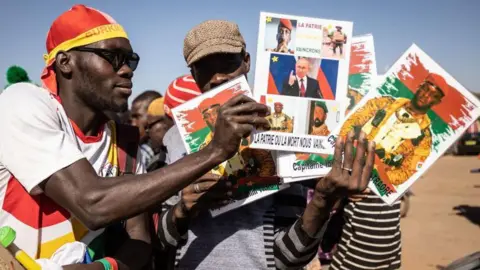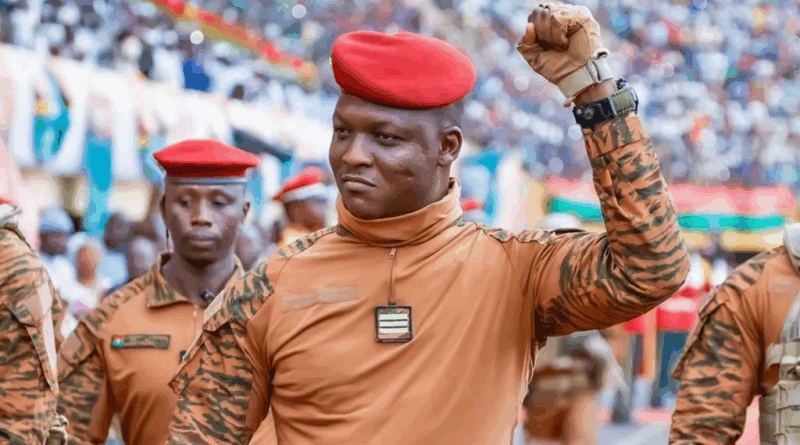Why Burkina Faso’s Junta Leader Has Captured Hearts & Minds Around The World
A charismatic 37-year-old, Burkina Faso’s military ruler Capt Ibrahim Traoré has skilfully built the persona of a pan-Africanist leader determined to free his nation from what he regards as the clutches of Western imperialism and neo-colonialism.
His message has resonated across Africa and beyond, with his admirers seeing him as following in the footsteps of African heroes like Burkina Faso’s very own Thomas Sankara – a Marxist revolutionary who is sometimes referred to as “Africa’s Che Guevara”.
“Traoré’s impact is huge. I have even heard politicians and authors in countries like Kenya [in East Africa] say: ‘This is it. He is the man’,” Beverly Ochieng, a senior researcher at global consultancy firm Control Risks, told the BBC.
“His messages reflect the age we are living in, when many Africans are questioning the relationship with the West, and why there is still so much poverty in such a resource-rich continent,” she said.
After seizing power in a coup in 2022, Traoré’s regime ditched former colonial power France in favour of a strong alliance with Russia, that has included the deployment of a Russian paramilitary brigade, and adopted left-wing economic policies.
This included setting up a state-owned mining company, requiring foreign firms to give it a 15% stake in their local operations and to transfer skills to Burkinabé people.
The rule also applied to Russian miner Nordgold, which was given a licence in late April for its latest investment in Burkina Faso’s gold industry.
As part of what Traoré calls a “revolution” to ensure Burkina Faso benefits from its mineral wealth, the junta is also building a gold refinery and establishing national gold reserves for the first time in the nation’s history.
However, Western-owned firms appear to be facing a tough time, with Australia-headquartered Sarama Resources launching arbitration proceedings against Burkina Faso in late 2024 following the withdrawal of an exploration licence.
The junta has also nationalised two gold mines previously owned by a London-listed firm, and said last month that it planned to take control of more foreign-owned mines.
Enoch Randy Aikins, a researcher at South Africa’s Institute for Security Studies, told the BBC that Traoré’s radical reforms had increased his popularity in Africa.
“He is now arguably Africa’s most popular, if not favourite, president,” Mr Aikins said.

His popularity has been fuelled through social media, including many misleading posts intended to bolster his revolutionary image.
AI-generated videos of music stars like R Kelly, Rihanna, Justin Bieber and Beyoncé are seen immortalising him through song – though they have done nothing of the sort.
Ms Ochieng said that Traoré first caught the attention of Africans when he spoke at the Russia-Africa summit in 2023, telling African leaders to “stop behaving like puppets who dance every time the imperialists pull the strings”.
This speech was heavily publicised by Russian media, which has become a major player in promoting Traoré’s pan-Africanist image.
Thanks to his rhetoric and pushed by a slick social media campaign, his appeal has spread around the world, including among African-Americans and Black Britons, Ms Ochieng noted.
“Everyone who has experienced racism, colonialism and slavery can relate to his messages,” Ms Ochieng said, pointing out that African-American rapper Meek Mill had posted about him on X late last year, saying how much he liked his “energy and heart” – though he was ridiculed for mixing up names by referring to Traoré as Burkina Faso and later deleted the post.
But France’s president is not a fan, describing Traoré as part of a “baroque alliance between self-proclaimed pan-Africans and neo-imperialists”.
Emmanuel Macron was also referring to Russia and China whom he accused, in a 2023 speech, of provoking coups in Africa’s former French colonies, and hypocritically stirring up old arguments over sovereignty and colonial exploitation.
Traoré’s popularity comes despite the fact that he has failed to fulfil his pledge to quell a 10-year Islamist insurgency that has fuelled ethnic divisions and has now spread to once-peaceful neighbours like Benin.
His junta has also cracked down on dissent, including the opposition, media and civil society groups and punished critics, among them medics and magistrates, by sending them to the front-lines of the war against the jihadists.
Credit BBC



